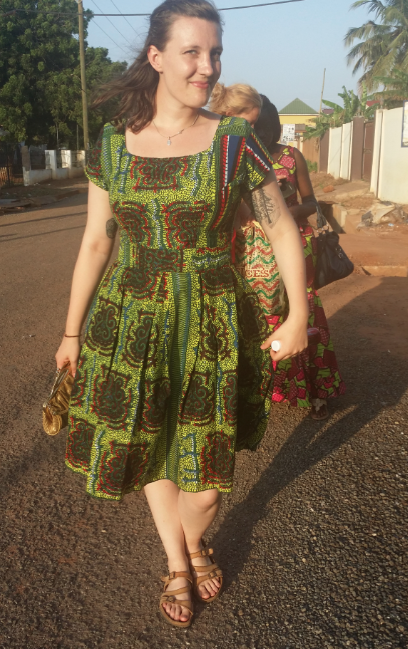‘Obroni’ is a term in Twi, one of the many Ghanaian dialects, that translates literally to ‘white person’.
In my short time in Ghana I have come to have a love hate relationship with this term. It can be used in a loving way; my host mother, Margaret, affectionately calls me her ‘Obroni baby’. This I very much enjoy as an acknowledgement that while I may not be the same as the other members of her family, I still belong and she treats me like a daughter.
On the other hand the term changes in nature when I am taking a tro tro (a Ghanaian public bus) to and from my place of work. At crowded bus stops I hear adults and children shout Obroni! Obroni! Sometimes it is a clear attempt to get my attention if I have taken a wrong turn or dropped my water bottle on the ground. In other cases it can feel more aggressive; a ruthless acknowledgement of my clear difference from the community. In these cases I find the term isolating and I feel profoundly alone in the ever-crowded markets that house the bus stations in Accra.
The paradoxical and complex perceptions around calling an individual by their race is difficult to navigate for Ghanaians and foreigners alike.
In my short time here I have spoken to locals who endorse the call outs as an expression of excitement to see an Obroni. It is simply the word that is used to describe a foreigner and intends no harm. Additionally, I have had discussions with those who fundamentally disagree with calling out an individual based on the colour of their skin.
Similarly to the local perspective, foreigners themselves are also undecided on the term. I know many Obronis who identify with the term and have fully accepted it as a part of their identity here in Ghana. At the same time, I have met others who distain being called out impersonally by a physical trait that is bestowed upon them at birth.
In my life I have been fortunate that this is one of the first times I have grappled with being called out by the colour of my skin.
I am privileged to be an individual who does not have any remarkable visible differences in my own society at home. That is I am a straight, white, able-bodied female. Despite challenges around my gender and the complex role of feminism in Canadian society, I blend in at the bus stop. I am not called out for my race. I never feel separate from those I share my daily commute with.
From my perspective, working to understand the perspectives about the term Obroni is an opportunity to grow my own understanding of how to people perceive physical differences globally. In many ways I am thankful and will continue to be for all of the complex reckonings to come.
With love from the Obroni at the bus stop,
Kat

Reblogged this on ghanalycia and commented:
I’ve been meaning to write about being a visible racial minority for the first time in my life, and how that intersects with my privilege. It’s a complex experience to unpack. So, until I get my head on straight about it, take a look at my friend Kat’s succinct, eloquent thoughts on the matter. 🙂 Enjoy!
LikeLike
Great insights. I’m glad you see it as an opportunity to learn! Looking forward to more of your insights on the subject! 🙂
LikeLike